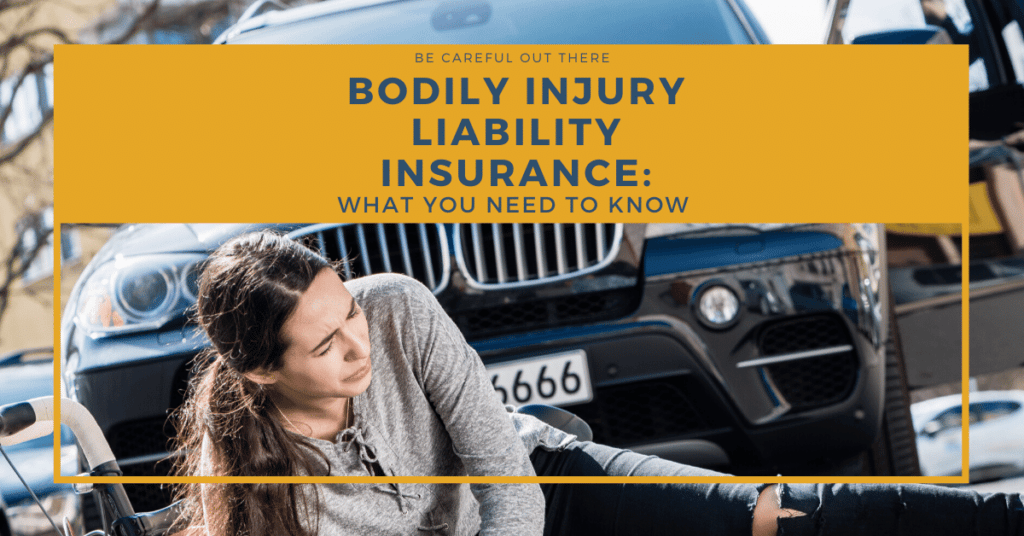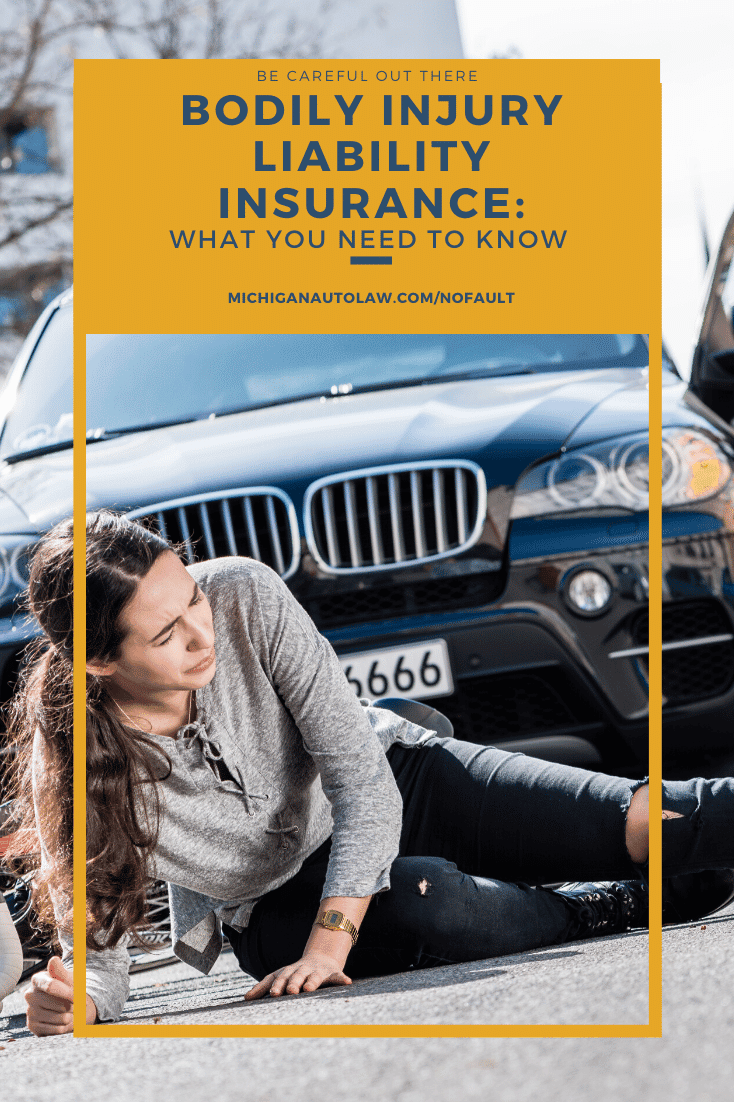Michigan Bodily Injury Liability Insurance: What You Need To Know

In Michigan, bodily injury liability insurance provides coverage if a driver is at-fault in causing a car accident that results in someone being hurt or death. Up to the policy limit, it will pay for pain and suffering compensation, excess medical benefits and lost wages and other economic damages that the driver owes to any injured persons.
Anyone who drives regularly in Michigan is legally required to carry this auto insurance coverage with statutorily-set minimum coverage limits.
Under Michigan’s auto No-Fault insurance law, this auto insurance coverage is also referred to as “residual liability insurance.”
What is bodily injury liability insurance in Michigan?
In Michigan, bodily injury liability insurance provides coverage if you are sued for causing a car accident that injured or killed another person. It pays up to your policy limit for pain and suffering compensation, excess medical benefits and lost wages and other economic damages that you are deemed liable for.
What does bodily injury liability insurance cover in Michigan?
In Michigan, if you are at-fault for a car accident that injures or kills someone, your bodily injury insurance covers your liability for the injured person’s pain and suffering, excess medical benefits and lost wages and other economic damages. The extent of your coverage depends on your liability policy limit.
Specifically, your Michigan bodily injury liability insurance – which the No-Fault law calls “residual liability insurance” – covers your “tort liability” for the following up to the limit you selected in your policy:
- Pain and suffering compensation (MCL 500.3131(1); 500.3135(1), (2) and (3)(b))
- Excess medical benefits (which consists of either: (1) car accident-related medical bills that exceed the No-Fault PIP medical benefits coverage level selected in the policy through which an injured person is claiming benefits (see MCL 500.3107c(1); or (2) all of the accident-related medical bills incurred by a driver who has opted out of No-Fault medical coverage altogether (see MCL 500.3107d(1)) (MCL 500.3131(1) 500.3135(3)(c))
- Excess lost wages (MCL 500.3131(1); 500.3135(3)(c))
- Damages for economic loss if the victim is a non-Michigan resident (MCL 500.3131(1); 500.3135(3)(d))
How much bodily injury liability insurance do I need in Michigan?
In Michigan, the law states you need bodily injury liability insurance with limits that provide coverage of $250,000 if you cause a car accident that results in someone being hurt or death to one person and $500,000 if there are two or more victims.
Michigan law requires that anyone who drives regularly in Michigan must have this insurance coverage in the following amounts:
- “[N]ot less than $250,000.00 because of bodily injury to or death of 1 person in any 1 accident.” (MCL 500.3101(1); 500.3131(2); 500.3009(1)(a))
- “[N]ot less than $500,000.00 because of bodily injury to or death of 2 or more persons in any 1 accident.” (MCL 500.3101(1); 500.3131(2); 500.3009(1)(b))
Prior to July 2, 2020, the legally required minimum limits for this insurance were $20,000 and $40,000. (MCL 500.3101(1); 500.3131(2); 500.3009(1)(a) and (b))
Importantly, the law provides that a driver “may choose to purchase lower limits” of $50,000 and $100,000. (MCL 500.3009(5)). In Michigan, to choose the lower bodily injury liability coverage, you must sign a specific form that has been approved by the Michigan Insurance Commissioner – a sample of which can be found here.
Among other things, the form must “[s]tate, in a conspicuous manner, the risks of choosing liability limits lower than” the $250,000/$500,000 limits and you must acknowledge on the form that you understand “the risks of choosing the lower liability limits.” (MCL 500.3009(7)(a) and (c))
The coverage amount our attorneys recommend for Michigan drivers
Our attorneys recommend that Michigan drivers carry bodily injury liability insurance with limits of $500,000 and $1,000,000.
To learn more about our auto insurance recommendations, please check out our blog post, “How Much Car Insurance Do I Need?”
We know this is more than what the law requires, but the risk to drivers and their personal and family assets is greater now than it has ever been, thus necessitating even greater protection.
In Michigan, when a driver is at-fault in causing a car accident and he or she is determined to be liable for compensation or damages that exceed the limit in his or her bodily injury liability insurance policy, then the driver will have to pay for that excess. The auto insurance company won’t. The insurer’s obligation to pay ends when the policy limit is reached.
What that means for the driver is that he or she may be forced to use personal assets – such a home, vehicles, wages and income, savings, retirement, college account and investments – to pay for the compensation and damages that is not covered.
With respect to a victim’s pain and suffering compensation and excess lost wages, this risk has always existed for drivers, which is why we have always recommended that drivers carry liability coverage well above the $20,000/$40,000 minimums that have existed prior to July 2, 2020.
But now, as a result of changes to the No-Fault law which allow drivers to choose less than unlimited No-Fault PIP medical benefits coverage and/or to opt-out of No-Fault PIP medical benefits coverage altogether, the liability risks for drivers have multiplied significantly.
Specifically, drivers could now – unlike ever before in the more than 40-year history of Michigan’s No-Fault law – be held liable for the medical bills of people injured in an at-fault accident.
For example, suppose that you are at-fault in causing a car accident that results in serious or catastrophic injuries to another person and that person only has $50,000 in No-Fault medical coverage – or if that person has opted-out of No-Fault medical.
In addition to suing you and holding you liable for pain and suffering compensation and possible excess lost wages, the injured person could hold you liable for paying all of his or her accident-related medical bills in excess of his or her coverage level (or ALL medical bills in the event that the victim opted-out of No-Fault medical), which could run into in the hundreds of thousands or millions of dollars.
Does Michigan bodily injury liability insurance cover passengers?
In Michigan, bodily injury liability insurance covers passengers so that if you are at-fault in causing a car accident and your passengers are injured, then your auto insurance will pay up to your policy limit for any pain and suffering compensation, excess medical benefits and lost wages that you owe.
Does this auto insurance apply to out-of-state car accidents?
Michigan bodily injury liability insurance applies if you are at-fault in causing a car accident out-of-state.
It covers “bodily injury and property damage which occurs within the United States, its territories and possessions, or in Canada.” Additionally, it provides “coverage equivalent to that required as evidence of automobile liability insurance under the financial responsibility laws of the place in which the injury or damage occurs.” (MCL 500.3131(1))
Injured in a car accident and need legal help? Call Michigan Auto Law
If you were injured in a car accident in Michigan and have questions about your legal rights to compensation, call now (855) 781-7747 for a free consultation with one of our experienced car accident lawyers. There is no cost or obligation. You can also visit our contact page or use the chat feature on our website.
Michigan Auto Law is Michigan’s largest and most successful law firm that specializes exclusively in helping people who have been injured in auto accidents.
Our secret? Our car accident lawyers deliberately handle fewer cases than other personal injury law firms. This allows us to focus more time and attention on our cases.
Unlike other law firms, our auto accident attorneys are never too busy to promptly return phone calls and answer questions.
We have more than 2,000 5-Star Reviews that reflect this care and attention to detail.
More importantly, this client-focused approach leads to better and faster settlements for our clients. Michigan Auto Law has recovered more million-dollar settlements and trial verdicts for motor vehicle accidents than any other lawyer or law firm in Michigan. We’ve also recovered the highest ever reported truck accident and car accident settlement in the state.
Call now so we can start making a real difference for you.






